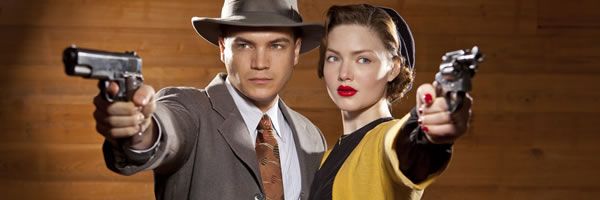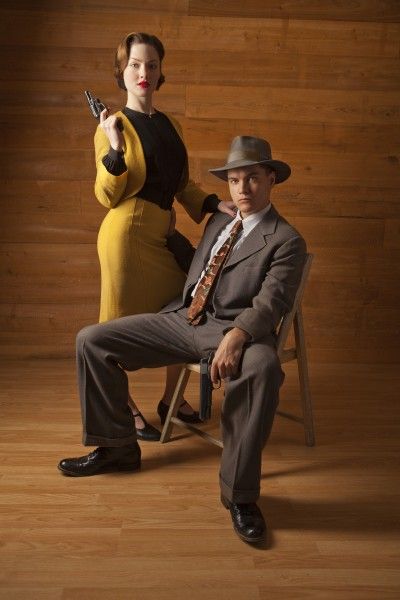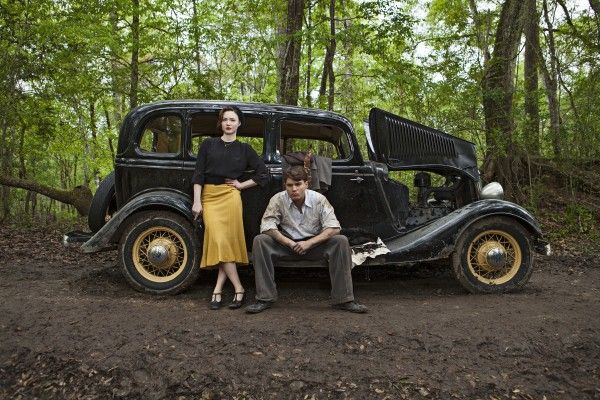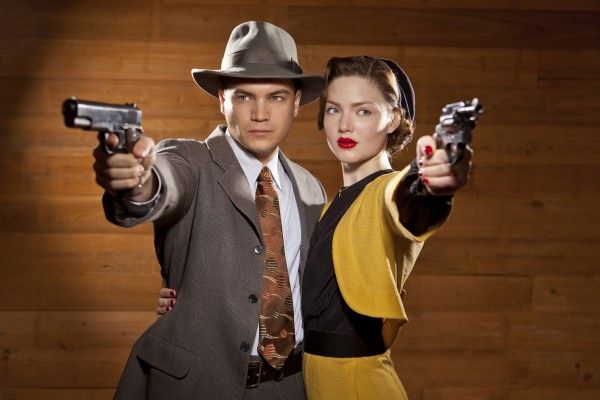In 1934, two young adults -- Clyde Barrow and Bonnie Parker -- were ambushed and killed by law enforcement in North Louisiana, immortalized after a murderous two-year crime spree that had captivated the nation. The tale of the two elicited such a frenzied response not because of the crimes themselves, which were mostly petty or forgettable during a time that included such infamous figures as John Dillinger and Pretty Boy Floyd, but because of Bonnie. She wasn't a captive during Clyde's raids, she participated and occasionally led them. Pictures found of the two from a hideout showed a cigar-smoking, gun-toting female, linked up with a man she was involved with, but not married to. The tabloid nature of the duo's misdeeds still carries some resonance today, which the new miniseries Bonnie and Clyde focuses on. Hit the jump for more.
The miniseries, starring Emile Hirsch (Into The Wild) and Holliday Grainger (The Borgias) as the infamous pair, will air on back-to-back nights on three networks simultaneously: A&E, History and Lifetime. Such scheduling seems to be in the hopes of making this a grandiose "television event," which, if successful, might be the first of many. But where Arthur Penn's 1967 Bonnie and Clyde film script was heavily influenced by French New Wave, playing off of the style of gangster films of the 1930s while modernizing it, there's nothing so inspired about this latest offering. Still, it has certain charms.
Any film or series that focuses on well-covered history is in the interesting position of either playing up to the audience's knowledge, or finding a new way to explore the material that makes the history just the backdrop. The new Bonnie and Clyde chooses the former. Not only does it open on the car and corpses from the infamous final shootout scene, but it makes the very odd choice to give Clyde "second sight," where his visions predict what viewers know are indeed future events.
So that part is pretty hokey. But the idea is not misguided. By incorporating Bonnie and Clyde's darkest moments leading up to their bloody demise, it gives a decent sense of foreboding to their antics and joy rides. On the other hand, the execution (no pun intended) of those moments leaves much to be desired, particularly when it comes to Bruce Beresford's scattered direction and straggling pace.
The miniseries also spends a lot of time on Clyde's formative years before launching into the heists (the nitty gritty of which is mostly glossed over). It sticks closer to the facts than that earlier film, though lacks more personal moments, like the sparring and shrillness between Clyde's sister-in-law Blanche Barrow (Sarah Hyland) and Bonnie, when the law breaking duo had become a quintet, as well as any question of Clyde's sexuality (sex being, of course, a driving factor when it comes to interest in the story both then and now). Though the miniseries does show the historical suggestion that Clyde had been sexually assaulted while in prison, his demeanor doesn't change much afterwards, whereas accounts at the time suggested that had a life-altering effect on him.
Instead, it's really a sociopathic Bonnie who acts as the instigator, with Clyde along for the ride and the occasional shootings. Clyde is torn up over the group's first accidental murder, while Bonnie says: "Am I a horrible person? That poor man is dead ... and I'm upset they used my sophomore picture [in the paper]." Grainger is luminous as Bonnie, and a good foil for Hirsch's staid and likable Clyde, but can overdo some of her delusions of grandeur in her obsession with fame. Then again, part of the blame must rest on the uninspired and often uneven script, which relies heavily on the theatrics of a star-crossed lovers theme.
Though the miniseries (which is beautifully costumed and features lush sets) does stick fairly close to facts, its fictional flourishes can be head-scratching. In a bizarre change, Clyde, who seems to garner no pleasure from the heists, appears to choose to stop himself and Bonnie by driving them straight into a trap set up by storied Texas ranger Frank Hamer (William Hurt), whom he both fears and seems to admire (despite his general hatred of law enforcement). In doing so, he's also intwining his fate with someone who is also famous, reinforcing the theme of this particular telling. Because of that, it nearly works, even though it makes Clyde bent on some kind of suicide mission, which puts a very strange and glum spin on their "spree."
The miniseries follows the trajectory of the media of the day -- Bonnie and Clyde go from folk heroes to despised outlaws -- but it lacks spark, and despite the knowledge that "the end is nigh" for the two and the rest of their gang, there is strangely never a sense of urgency. But it sticks to its theme, like when Hamer shames the journalist PJ Lane (Elizabeth Reeser, in a terrible bird's nest of a wig), for glamorizing such a murderous couple, even though she can't ever decide personally if she is pro-the duo or against them.
The lesson here is that the desire for fame coupled with desperation (the miniseries cuts the action with photos from the Great Depression) can be a powerful one, but without the media supporting that desire for celebrity, it might have extinguished on its own. For such an old story, that's certainly still a very contemporary issue. Bonnie's dreams of celebrity though end with bullets and blood spray. Perhaps the most resonating fact about that moment, which Clyde foresees and drives into, are his words, "I was giving my Bonnie just what she wanted: a big ending."
The Bonnie and Clyde 2-night event begins at 9 p.m. Sunday, December 8th with simultaneous broadcasts on A&E, Lifetime and History.




